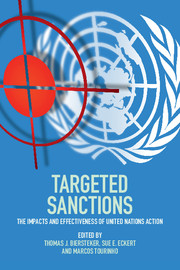Book contents
- Frontmatter
- Contents
- List of figures
- List of tables
- List of contributors
- List of abbreviations
- Introduction
- 1 Thinking about United Nations targeted sanctions
- 2 The purposes of targeted sanctions
- 3 Security Council dynamics and sanctions design
- 4 United Nations targeted sanctions and other policy tools: diplomacy, legal, use of force
- 5 The relationship between United Nations sanctions and regional sanctions regimes
- 6 Coordination of United Nations sanctions with other actors and instruments
- 7 Implementation of United Nations targeted sanctions
- 8 The impacts of United Nations targeted sanctions
- 9 The unintended consequences of United Nations targeted sanctions
- 10 The effectiveness of United Nations targeted sanctions
- 11 Institutional learning in targeting sanctions
- 12 Conclusion
- Appendix 1 List of cases and episodes
- Appendix 2 Sanctions effectiveness
- Appendix 3 TSC database codebook
- Appendix 4 Targeted Sanctions Consortium (TSC) participants
- Bibliography
- Index
8 - The impacts of United Nations targeted sanctions
Published online by Cambridge University Press: 05 March 2016
- Frontmatter
- Contents
- List of figures
- List of tables
- List of contributors
- List of abbreviations
- Introduction
- 1 Thinking about United Nations targeted sanctions
- 2 The purposes of targeted sanctions
- 3 Security Council dynamics and sanctions design
- 4 United Nations targeted sanctions and other policy tools: diplomacy, legal, use of force
- 5 The relationship between United Nations sanctions and regional sanctions regimes
- 6 Coordination of United Nations sanctions with other actors and instruments
- 7 Implementation of United Nations targeted sanctions
- 8 The impacts of United Nations targeted sanctions
- 9 The unintended consequences of United Nations targeted sanctions
- 10 The effectiveness of United Nations targeted sanctions
- 11 Institutional learning in targeting sanctions
- 12 Conclusion
- Appendix 1 List of cases and episodes
- Appendix 2 Sanctions effectiveness
- Appendix 3 TSC database codebook
- Appendix 4 Targeted Sanctions Consortium (TSC) participants
- Bibliography
- Index
Summary
Policymakers imposing sanctions expect them to have an impact, whether economic, political, or psychological. What makes UN targeted sanctions different from many traditional sanctions is that UN policymakers want to minimize the negative impacts on ordinary citizens in the target country. In most cases, this means that UN sanctions target individuals or particular activities that are linked to the threat the Security Council seeks to address. In some cases, however, noncompliance by the targeted regime leads to pressures to ratchet up the impacts by expanding sanctions or tightening their enforcement. In these cases, tensions often arise between sanctions that are effective in achieving compliance, or in supporting international norms, yet still have minimal impact on ordinary citizens.
This chapter looks, first, at the types of targeted sanctions that the United Nations employs and the psychological, political, or economic impacts that different sanctions can have. Sanctioning parties can aim targeted measures very narrowly on individual regime leaders or supporters, or they can broaden their aim to encompass whole sectors, such as aviation or finance, or commodities, such as oil, diamonds, or timber. Obviously, the types and severity of the impacts will differ widely as well. The second part of the chapter looks at how impacts can be measured and evaluated. The following sections examine whether different types of impacts are associated with different categories of goals, or with particular unintended consequences. I then discuss the challenges to keeping targeted sanctions targeted and a tentative assessment of the links between impacts and effectiveness. I conclude with suggestions for future research.
Types of targeted sanctions and impacts
Much of the previous research on sanctions focuses on economic measures, and therefore on economic impacts, as the principal path to policy impact and effectiveness. Targeted UN sanctions, however, include travel bans, diplomatic sanctions, and arms embargoes as well, where the principal impact might be political or psychological rather than economic. Moreover, this volume goes beyond the traditional assessment of the effectiveness of sanctions in terms of their ability to coerce changes in the target government's policies or behaviour. The research in this volume also examines the degree to which targeted sanctions contribute to constraining capabilities that are of concern or sending signals to various audiences.
In assessing the multiple purposes for which policymakers use sanctions, it is important to study all the potential impacts of sanctions.
- Type
- Chapter
- Information
- Targeted SanctionsThe Impacts and Effectiveness of United Nations Action, pp. 172 - 189Publisher: Cambridge University PressPrint publication year: 2016
- 3
- Cited by

